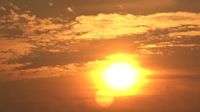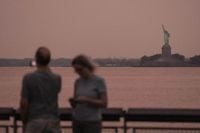For the third consecutive summer, thick plumes of smoke from Canadian wildfires have drifted across the U.S. border, blanketing much of the Midwest and Northeast in a persistent haze. The air quality in states like Michigan, Iowa, New York, North Dakota, Minnesota, and Wisconsin has repeatedly dropped to hazardous levels, sparking a political firestorm almost as intense as the blazes themselves. This year, the debate over responsibility and solutions has reached new heights, with Republican lawmakers in the United States openly blaming Canada for what they describe as a failure to prevent and contain the wildfires whose smoke has fouled American skies.
In a series of sharply worded statements and letters, Republican members of Congress have expressed outrage and indignation at what they see as Canadian mismanagement. "Instead of enjoying family vacations at Michigan’s beautiful lakes and campgrounds, for the third summer in a row, Michiganders are forced to breathe hazardous air as a result of Canada’s failure to prevent and control wildfires," read a statement from Michigan’s GOP congressional delegation, as reported by the Associated Press. Similar complaints have echoed from Republican lawmakers in Iowa, New York, North Dakota, Minnesota, and Wisconsin. Their demands are clear: Canada must increase forest thinning, conduct more prescribed burns, and adopt other aggressive wildfire prevention measures.
Some Republicans have gone further, warning that the ongoing smoke is straining relations between the two countries and suggesting that the U.S. could even raise the issue in future tariff negotiations. The letters and statements are filled with language of frustration and a sense that urgent action is needed. Yet, as climate scientists and Democratic lawmakers are quick to point out, these demands conspicuously omit any mention of climate change—a factor many experts consider central to the crisis.
According to BBC and the Associated Press, scientists argue that ignoring climate change not only sidesteps the root causes of worsening wildfire seasons but also overlooks the significant role the U.S. plays in global emissions of heat-trapping gases. Jennifer Francis, a climate scientist at the Woodwell Climate Research Center in Cape Cod, Massachusetts, was blunt in her assessment: "If anything, Canada should be blaming the U.S. for their increased fires." The logic is straightforward—carbon emissions from burning fossil fuels like coal and gas, much of which originate in the U.S., contribute to the warming and drying conditions that make catastrophic wildfires more likely on both sides of the border.
On August 12, 2025, in response to mounting criticism and the growing scale of the crisis, the Canadian government announced nearly $46 million in funding for wildfire prevention and risk assessment research projects. Corey Hogan, parliamentary secretary to the federal energy and natural resources minister, emphasized that no one is more motivated to address wildfires than Canadians themselves. However, he also underscored the international dimension of the problem, stating, "I think this also underlines the international challenges that are brought on by climate change … we need to globally tackle this problem."
The scale of the fires in Canada is, by any measure, staggering. Ken McMullen, president of the Canadian Association of Fire Chiefs, described how the country has been battling wildfires at unprecedented rates since 2023, the year Canada experienced its largest wildfire on record. The first wildfire of 2025 ignited in April, one of the earliest starts ever documented, and by mid-August, more than 700 wildfires were burning across the country. Two-thirds of these were classified as out of control. According to the Canadian Interagency Forest Fire Centre, over 28,000 square miles—about 72,520 square kilometers—have burned in 4,400 separate wildfires so far this year. That’s almost five times the area burned in the U.S. during the same period.
Most wildfires in Canada are started by people, usually by accident, though in remote areas, lightning is often the culprit. McMullen has observed dramatic environmental changes in recent years, including the drying up of sloughs and basins and the retreat of lake waters that once lapped at residents’ back doors. While he avoids taking a public stance on the role of climate change, he acknowledges, "People can make up their own mind as to why that is. But something clearly has changed."
The political debate in the U.S. has grown increasingly polarized. Former President Donald Trump, who has called climate change a hoax, worked during his administration to dismantle federal climate science programs and withdraw the U.S. from the Paris Climate Agreement. Many in the GOP continue to downplay or deny the role of climate change in the current crisis. Minnesota state Rep. Elliott Engen, a Republican, put it this way: "That’s not an immediate fix for my constituents; that sounds like a blame game without a solution being presented." Engen and other Republicans have pushed for a review of Canada’s wildfire management practices by the International Joint Commission, focusing on practical mitigation rather than climate policy.
On the other side of the aisle, Democratic lawmakers argue that refusing to address climate change is itself a form of denial that hinders any real progress. Democratic Rep. Chellie Pingree of Maine said, "Rather than accept this reality and work together to find proactive, common-sense solutions for preventing and mitigating these fires, Republicans are burying their heads in the sand." Wisconsin Rep. Gwen Moore criticized her Republican colleagues’ letter to Canada’s ambassador, saying those "who are in denial about climate change shouldn’t be writing letters prescribing people’s actions to try to contain it."
The practical challenges of fighting Canada’s wildfires are immense. The country’s vast and often remote territories mean that some fires are simply too difficult—or too dangerous—to fight directly. In many cases, if no homes or infrastructure are at risk, the only viable option is to let the fires burn. Prescribed burns and thinning are used where possible, but experts note that these measures aren’t always feasible in the diverse forests and prairies that make up Canada’s landscape.
McMullen has advocated for a national Canadian forest fire coordination agency to better deploy resources, but he’s realistic about the limits of what can be done. University of Michigan climate scientist Jonathan Overpeck summed up the situation: "I don’t think there’s much they can do." He pointed to the warming and drying of northern Canada’s vast boreal forests as a key factor, with melting permafrost making the land even more susceptible to fire. Overpeck called for greater collaboration between the U.S. and Canada, noting, "Our smoke is their smoke, their smoke is ours. As long as this trend of warming and drying continues, we’re going to get a worsening problem. The good news is … we know what the cause is … we can stop it from getting worse."
As the smoke continues to drift and the political winds swirl, the wildfire crisis has become a test of not just environmental policy, but of international cooperation and political will. Both the flames and the debate show no signs of abating.


